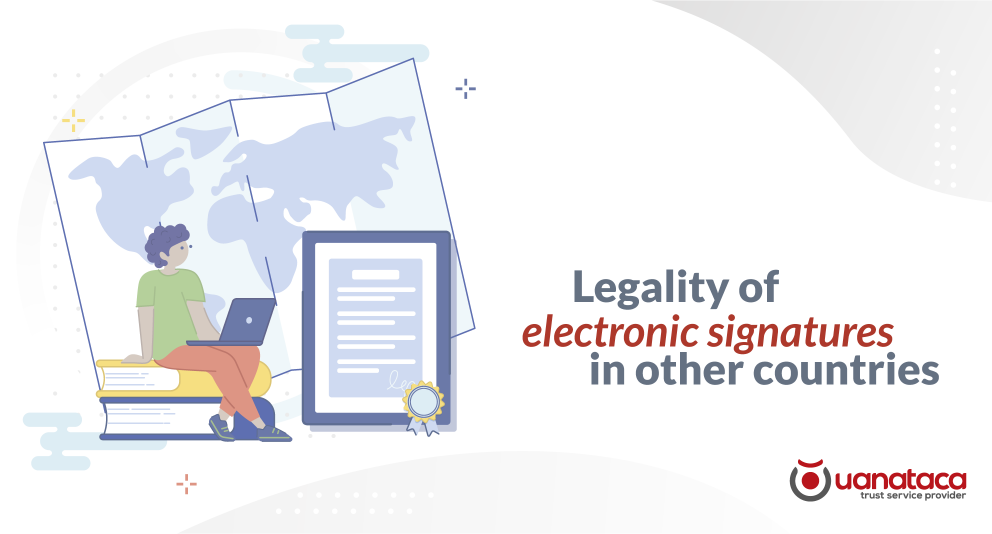
Buying goods and contracting services through digital means as well the exchange of documents related to commercial operations is increasingly common in developed economies and in developing countries. When these commercial operations take place between different countries, it is common asking to ourselves about some aspects related to the digital management of commercial processes or contractual relationships.
In this article, we will try to clear up the most common doubts about the cross-border legality of electronic signatures.
Digitization of document management in commercial operations
Commercial transactions and the exchange of documents in commercial operations takes place either in public administrations for the exchange of tax and customs information, as well in the private sector in business operations in which a lot of information like data, banking information, contracts, invoices, delivery notes or statements, among other documents are shared. It is increasingly common their document management is carried out in digital automated format, optimizing the full process.
Of course, when considering the exchange of information in digital formats, such as offers, contracts, invoices or any other kind of documents related to commercial operations that in most cases require authenticity, traceability, integrity and expression of willingness to accept or approve the content of the documentation, it is inevitable to consider the use of electronic signatures.
However, what happens when these commercial operations are carried out between people or companies established in two or more different countries?
In these cases, questions about different legal aspects or specific features of the electronic services are frequently asked, such as: does the electronically signed documentation have legal effects in a country other than the country where the signatory companies or individuals are located? Would it be legal? In all the countries? Who can provide us with these services? These are just some of the issues that arise when digitizing processes or digitally managing our business and contract relations beyond our borders.
Is electronic signature legal in all the countries?
The first thing we have to consider is that agreement in general are ruled by the principles of autonomy of the will of the parties and contractual freedom of choice, by which is recognized the power of the parties to self-regulate the contractual conditions, including, for example, the ways in which consent is given or represented.
The foregoing means that, regardless of whether the parties are in the same country or in two different ones, their willingness to accept the use of the electronic signature is sufficient for producing legal effects in the contract or in any other related document.

In this sense, it is important to highlight that commercial practices of the country or the sector in which the parties develop their commercial activity might be key for determining the acceptability of a method as a contracting valid mean. ¿What does it mean? It means that if the internationally accepted commercial practices in the sector or industry in which the contracting parties work, accept the use of the electronic signature as a valid contracting instrument and the parties do not state otherwise, no additional recognition is required for the use of signatures electronic in related documents.
If we would want to analyze the legality of the electronic signature from a strictly “legislative approach”, we might want to check whether in all the countries involved in the operation the use of electronic signatures exists, is allowed or recognized as a valid mean of proof to represent the will or acceptance. This point, normally can be easily verfy by checking out if in these countries there is an electronic signature regulation.

In the case of Latin American countries and even common law countries such as the United States of America, all countries -but exceptional cases- have legislation on electronic signatures that recognize the legal value of foreign electronic signatures, even in the case of qualified electronic signatures after meeting some requirements.
In the case of European Union States, this point is even easier to solve, given the regulation on electronic signatures is the same, the well-known and often mentioned eIDAS Regulation. This regulation uniformly regulates the European Digital Single Market, regarding the implementation of trustworthy electronic services such as electronic signatures, so the use of electronic signatures in every country within the EU is fully recognized in any other member state.
In this sense, people and companies established within the member states of the European Union, can use electronic signature solutions without restrictions for contracting and exchanging documentation in digital format for commercial operations and of any kind unless a legal prohibition applies.
Therefore, a citizen or company located in a country such as Spain can use an electronic signature to sign a contract with a person located in Belgium, Germany, Portugal or any other member state of the European Union, with total certainty that it will have full legal effects and that the assessment of these signature as legal evidence will be done under a common regulatory framework.
Similar situations can occur in other countries that have framework regulations that establish mutual recognition among them, such as the Mercosur member states and other similar initiatives.
The qualified provider of trust services: provider of signature solutions in international operations
Trust Service Providers such as Uanataca, with presence and accreditations both in the European Union and in multiple Latin American countries, can facilitate the implementation of signature solutions in international operations with greater ease, guaranteeing compliance with the particularities of the countries involved while ensuring the best internationally accepted certification practices.
It has been widely commented in previous entries of this blog that the legality or legal value of electronic signatures is not determined by the geographical location where they are made, but by the elements related to the signature itself. Among the main features that we must consider when assessing it are: the unique link to the signatory established through a secure issuance process that allows identifying her, and also the linked to the data signed in such a way that any subsequent change in the data is detectable.
How can we help you ?
Uanataca besides being a qualified Provider, works to offer a 360º offer around the services, led by a multidisciplinary team of professionals with great technological, legal and business experience that offers the best advice and support to provide technical and legal guarantee to your processes and workflows.
Contact us by writing an email to info@uanataca.com or call us at +34 935 272 290